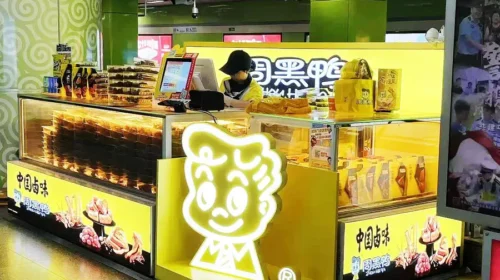Trade war clouds sweetener giant Newtrend’s IPO plan

With more than one-third of its revenue tied to the U.S., the company’s Hong Kong IPO could face uncertainty as tariffs and overcapacity weigh on its prospects
Key Takeaways:
- Newtrend’s Hong Kong IPO application has been approved by China’s securities regulator, even it faces pressures both at home and abroad
- The company’s heavy reliance on the U.S., which accounted for 35.2% of its revenue last year, could squeeze its profitability as it feels the effects of new tariffs
By Xia Fei
A sugar rush among Chinese artificial sweetener makers is hitting a new high as a member of the group gears up for an IPO in Hong Kong. But the building trade war between China and the U.S. is adding a sour note to that plan.
Newtrend Technology Co., one of China’s biggest makers of popular sugar substitutes including glycine and sucralose, received a greenlight from China’s securities regulator last week for its plan to list in Hong Kong, joining half a dozen other Chinese sweetener makers already trading publicly.
Unlike many of its Chinese peers, the company appears to be suffering less from industrial overcapacity at home, a common problem in many Chinese industries. Instead, Newtrend has avoided that by focusing on global clients – predominantly in the U.S. and Europe – which it serves through manufacturing sites in Thailand and Indonesia.
Nearly 80% of Newtrend’s revenue came from overseas clients last year, with North America contributing to 41% of the total. According to trade database Volza, Newtrend’s main customers include the likes of U.S. food and beverage giants Coca-Cola and Kraft.
While its overseas strategy has served the company well so far, it could soon turn into a liability as China and the U.S. get locked in a trade spat with no end in sight. That could raise questions about Newtrend’s prospects, putting a damper on its valuation if and when it completes the Hong Kong listing.
Fading American dream?
Despite its base in interior Jiangxi province in the city of Jinggangshan, where Mao Zedong established his revolutionary base and is now a tourism hotspot among patriotic Chinese, Newtrend has an unusually global vision.
Seizing on a burgeoning generation of health-conscious consumers, the company, founded in 2003, leans heavily towards producing sucralose, a fifth-generation artificial sweetener, expected to be the fastest growing type of sugar substitute over the next five years, Newtrend disclosed in its listing document filed in February.
In 2023, global agencies including the World Health Organization declared aspartame, a third-generation artificial sweetener created in 1965 and one of the industry’s most popular sugar substitutes, may cause cancer, giving Newtrend and other sucralose producers a boost.
Unlike Anhui Jinhe Industrial Co. (002597.SZ) and a handful other competitors, Newtrend is the only Chinese artificial sweetener producer to manufacture abroad, setting up its first overseas facilities in 2019. The step was quite forward-looking, aimed at avoiding getting caught in the U.S.-China trade war during the first administration of U.S. President Donald Trump.
“In order to diversify the risk brought by extra duty imposed by the United States, we produced food-grade glycine in the Indonesia plant and exported our food-grade glycine to our customers in the United States from Indonesia,” the company said in the filing. Still, the glycine exports from Indonesia were ultimately subject to a 4.2% anti-dumping levy by the U.S., while sucralose shipped from China to the U.S. was slapped with a similar 3.7% tax.
Now, a rapidly escalating tit-for-tat trade war between China and the U.S. is likely to deal a much larger new blow to Newtrend, which counts America as its most important overseas market.
The Trump administration raised U.S. tariffs on all Chinese imports to 145% this month, prompting China to take retaliatory measures. But more importantly for Newtrend, Trump also threatened to slap a 32% levy on goods from Indonesia and 36% on imports from Thailand. Trump later put a 90-day pause of those threatened tariffs, pressuring the two countries to negotiate trade deals with the U.S. during that time.
Sales of sucralose and edible glycine to America made up 35.2% of Newtrend’s revenue last year, up sharply from just 9% in 2022. Some 41% of the company’s revenue last year came from North America, up from just 9.3% in 2022, while the share for Europe declined to 20.9% in from 32.1% over that period, the firm disclosed.
Newtrend’s revenue hit 761.5 million yuan ($104.3 million) in 2022, before an oversupply-induced price drop in glycine and sucralose caused sales to plunge more than 40% to 446.9 million yuan in 2023. Its revenue bounced back somewhat last year to 568.9 million yuan, though the figure was still well below the level from 2022.
Challenges at home
It remains unclear whether Newtrend’s American clients will absorb some or all of the additional tariffs, which could have the effect of more than doubling prices. If not, Newtrend — which sells at higher margins abroad — may be forced to swallow some of the added costs itself and also to rely more on domestic demand. But the domestic market is hardly a friendly place, plagued by intense price wars due to overcapacity.
That means any domestic shift may be an uphill battle, putting further pressure on the company’s profitability. Newtrend’s gross profit margins have already declined steadily from 25.6% in 2022 to 17.9% in both 2023 and 2024, as domestic sucralose prices plunged from 386,261 yuan per ton in 2022 to 148,904 yuan per ton last year, according to its prospectus.
As its margins got squeezed, the company’s profit fell to 43 million yuan last year from 45 million yuan in 2023, after tumbling from 122 million in 2022.
Newtrend’s decision to pursue an IPO in Hong Kong followed an earlier unsuccessful attempt to list on the domestic A-share market in Shanghai and Shenzhen. The company scrapped that plan after facing scrutiny from Chinese securities regulators last August over frequent ownership changes and concerns that its planned projects might fail to meet environmental criteria.
Newtrend’s highly concentrated ownership structure is also noteworthy, though not uncommon for a family-owned Chinese company. Founder Wang Xiaoqiang, 67, and his wife Ding Dan together own 54.8% of the company through various entities. Their son, Wang Hao, a 34-year-old Cornell University graduate, serves as managing director and leads the sales team.
Shares of established industry leader Anhui Jinhe Industrial have lost nearly half of their value since 2022, while Guilin Layn Natural Ingredients (002166.SZ), which also makes sweetener, is also down 44% from its 2022 high.
Still, both firms currently trade at a price-to-earnings (P/E) ratios of around 25 times and 34 times, respectively, far above the 8.6 times for Britain’s Tate & Lyle (TATE.L), which invented sucralose in 1976. A multiple in the middle of the range of its Chinese peers would value Newtrend at around 1.3 billion yuan. But investors would be right to worry that any sugar high following the company’s listing may be short-lived due to all the uncertainties raised by the U.S.-China trade war.
To subscribe to Bamboo Works free weekly newsletter, click here




